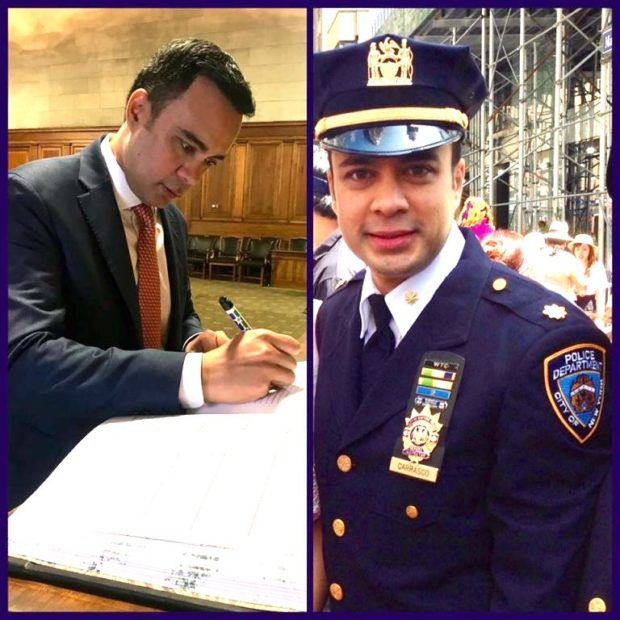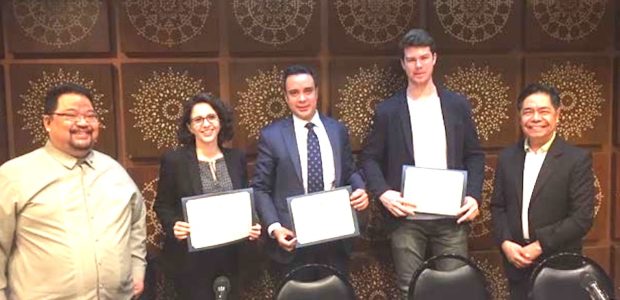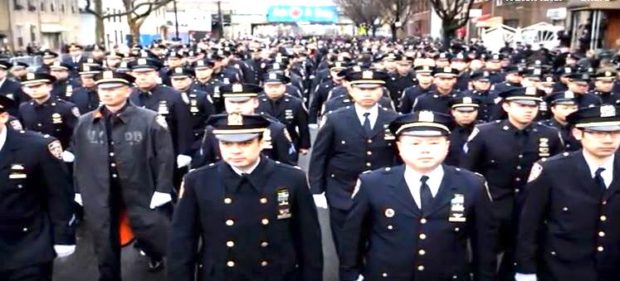
The transition from police work to lawyering is a natural one, Edward Carrasco says. Both roles involve finding solutions to people’s problems. THE FILAM
NEW YORK — Back when he was a police officer, Edward Carrasco was putting bad guys away. Now, after 22 years with the NYPD, he has jumped the tracks and is on a different career path. He is now a lawyer who, at some point, may wind up possibly defending some of the bad guys.
Carrasco, who retired in 2017 with the rank of Deputy Inspector, recently opened his private law practice in Midtown, and is taking on clients in New York and New Jersey. About 75 percent of his clients are Filipinos.
The irony is not lost on Carrasco, the highest ranking Filipino American in the history of the NYPD.
“Attorneys are allowed to refuse cases where there is a conflict of interest or for other reasons. I would not take a case unless I know that I would be able to defend my client 100 percent,” he said when asked if he could end up defending violators of the law.
Carrasco grew up in Vinzons, Camarines Norte where his family spoke Tagalog instead of the Bicol language. The son of a nurse, he came to New York as a teen and studied at Saint Francis College in Brooklyn, graduating cum laude. He went home to Manila for a year after college to work in marketing before coming back to NYC to become a police officer. He earned his Master of Arts in 1999 from CUNY’s John Jay College of Criminal Justice.
At the NYPD, he started out doing various patrol, investigative, and administrative assignments. For two years from 2006, he became an Executive Officer for the 23rd Precinct in Manhattan, where he designed the Robbery Reduction Initiative, which cut the crime by 23 percent. He became Commanding Officer for the School Safety Division in Brooklyn, Queens, and Staten Island public schools until 2009.
He took a one-year leave and went to Harvard University’s John F. Kennedy School of Government, where he earned his master’s in Public Administration in 2010. On his return to the NYPD, he was placed as the Commanding Officer of the Office of Management Analysis and Planning’s Special Projects Unit—the policy arm of the police department. There, he oversaw a staff that included attorneys.
“It was then that I began to seriously consider law school,” he said.
He started law studies at CUNY School of Law during his last two years in the police department, completing his final year and legal clinics after retirement.
In the following Q-A, Carrasco responded to The FilAm’s questions.

Newly minted attorney Edward Carrasco (center) was a speaker at an immigration rights seminar at the Philippine Consulate. With Carrasco (from left) Deputy Consul General Kerwin Tate, Gloria Garcia of the New York County District Attorney’s Office, Jack Lally of the Mayor’s Office of Immigrant Affairs, and Consul General Claro Cristobal. He is a member of the Filipino American Lawyers Association of New York. LAMBERT PARONG
The FilAm (TF): Tell us about your transition from law enforcement to lawyering.
Edward Carrasco (EC): The transition seemed like a natural one for me. Part of a police officer’s job is to investigate, find witnesses, and help find solutions to people’s problems. It’s typically not different from being a lawyer, where you are presented with varying problems and your job is to help find a solution.
TF: Isn’t retirement typically a time to slow down and travel the world? What made you decide to try an intense, demanding career?
EC: I don’t believe in retirement. I don’t believe in all work and no play, either. I’m the type of person who has to keep active—physically and mentally—and not having meaningful work would get boring rather quickly. The key is finding a balance. Despite my work I still make time for travel, family, and friends.

Carrasco with NYPD colleagues. CONTRIBUTED
TF: What was your first case?
EC: I worked in a law firm for a year as part of my legal clinic, prior to graduation. I had the opportunity to learn trial skills from a very well-regarded lawyer. The first case I worked on was a high-profile case that, unfortunately, I cannot discuss because of client confidentiality.
TF: You are now on a different side of the law. At some point you will be defending suspects even if you know they may have committed a felony. Isn’t that weird?
EC: Not really. The system does not allow conviction unless the accused has been proven guilty beyond a reasonable doubt. Each individual accused of a crime is entitled to a competent, vigorous defense.
With fellow Asian officers in the NYPD. Screengrab/Makilala TV.
TF: Do you have a law office, partners?
EC: I have a small office in Midtown, Manhattan, but I can meet clients anywhere. Most of the time I am in Queens, but I have travelled upstate and N.J. to meet with clients. Although I work by myself, I am affiliated with a number of lawyers. I like having a network of lawyers that I can call on to help assist me with cases or for me to refer clients to. The most successful cases I’ve worked on involved collaboration from a number of people with varying experience.
TF: Theoretically, the people you put behind bars…can they hire you as their lawyer?
EC: If it is a case I directly worked on, I would decline taking on the client as that would likely be a conflict of interest.
TF: Doesn’t being an ex-cop give you an advantage because you are familiar with the court system, the judges, etc.?
EC: It does to some degree—especially in regard to investigations and police procedure. However, there is no substitute for actual legal experience.
TF: What are your ex-colleagues saying about your new career?
EC: My former colleagues are very supportive of my new career. A few of them have even referred their friends and family to me. © The FilAm 2019

